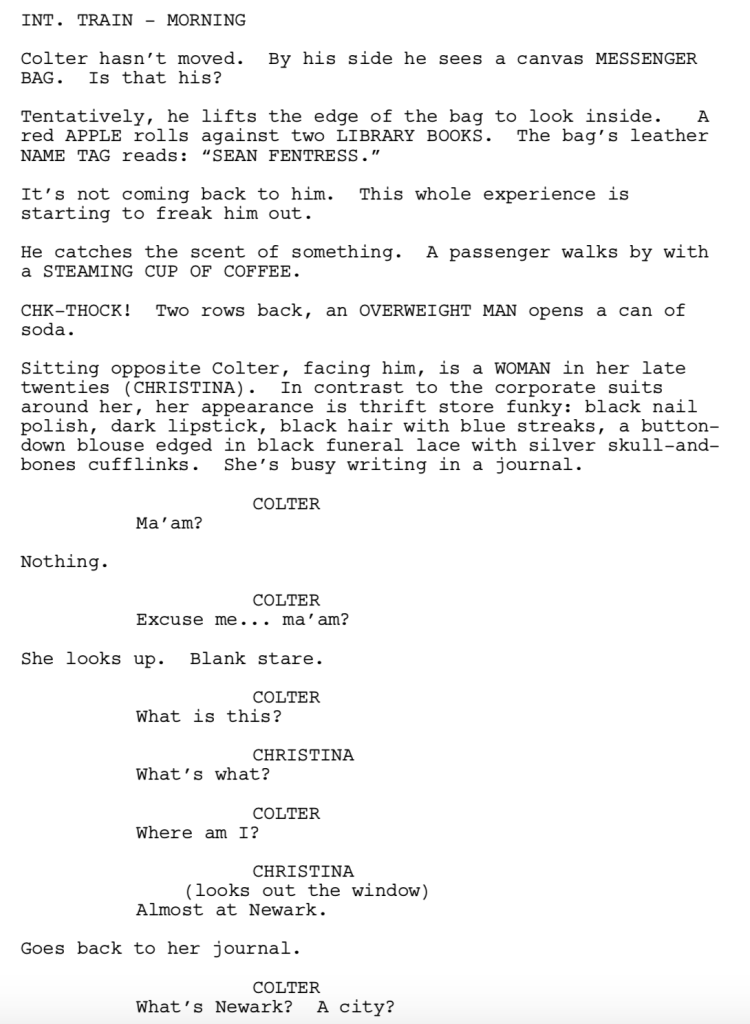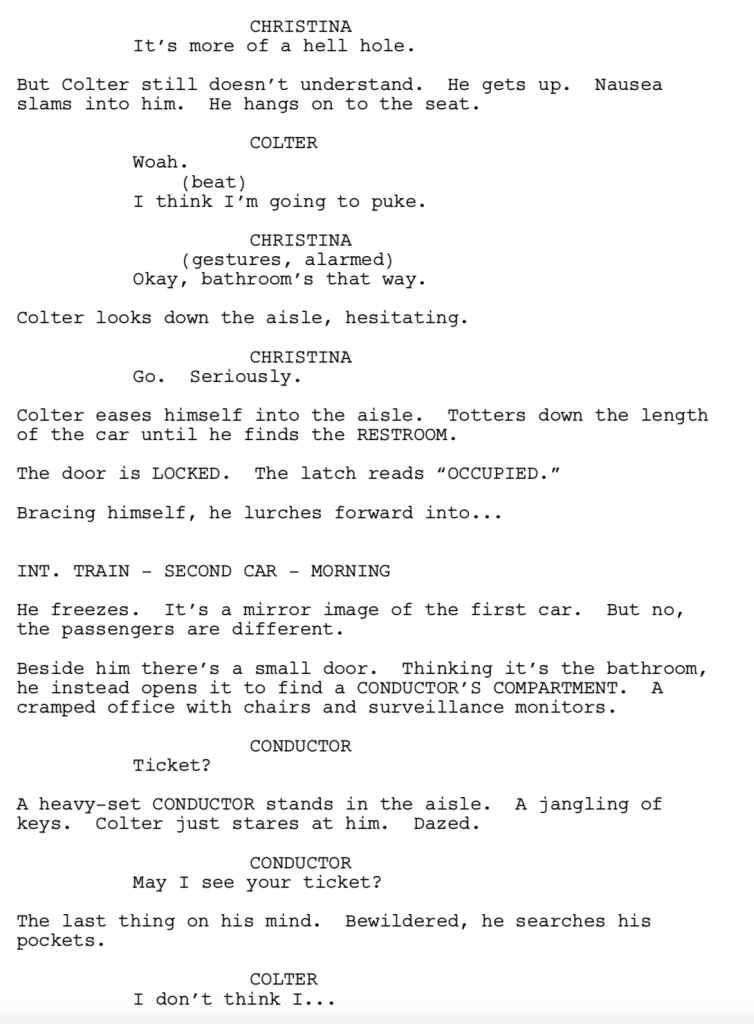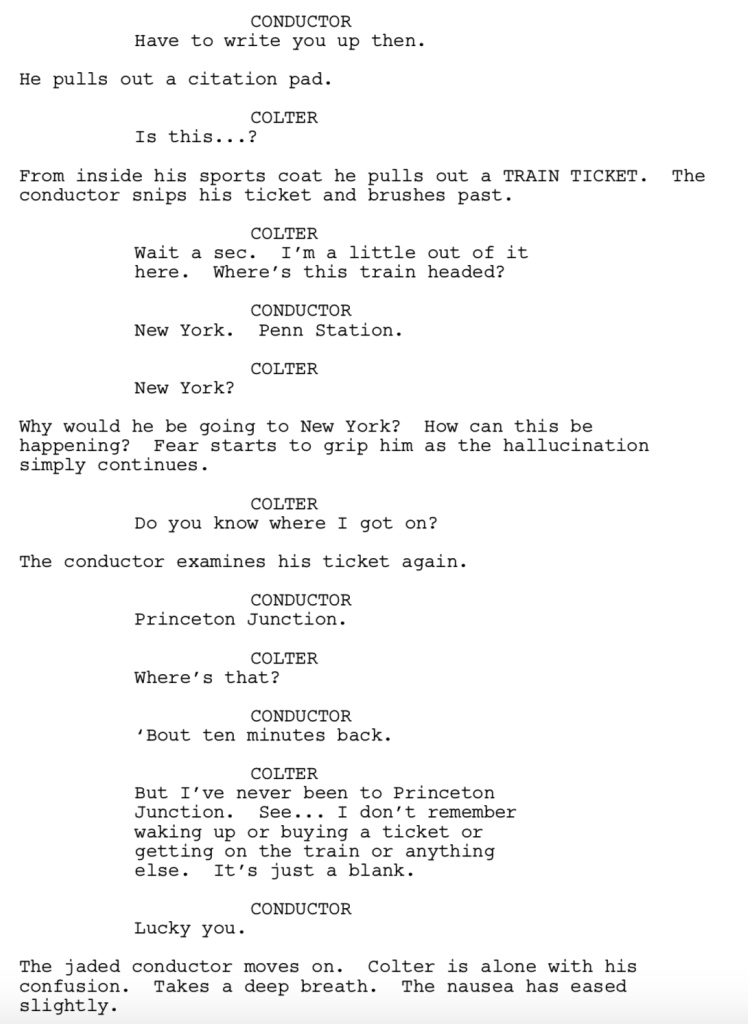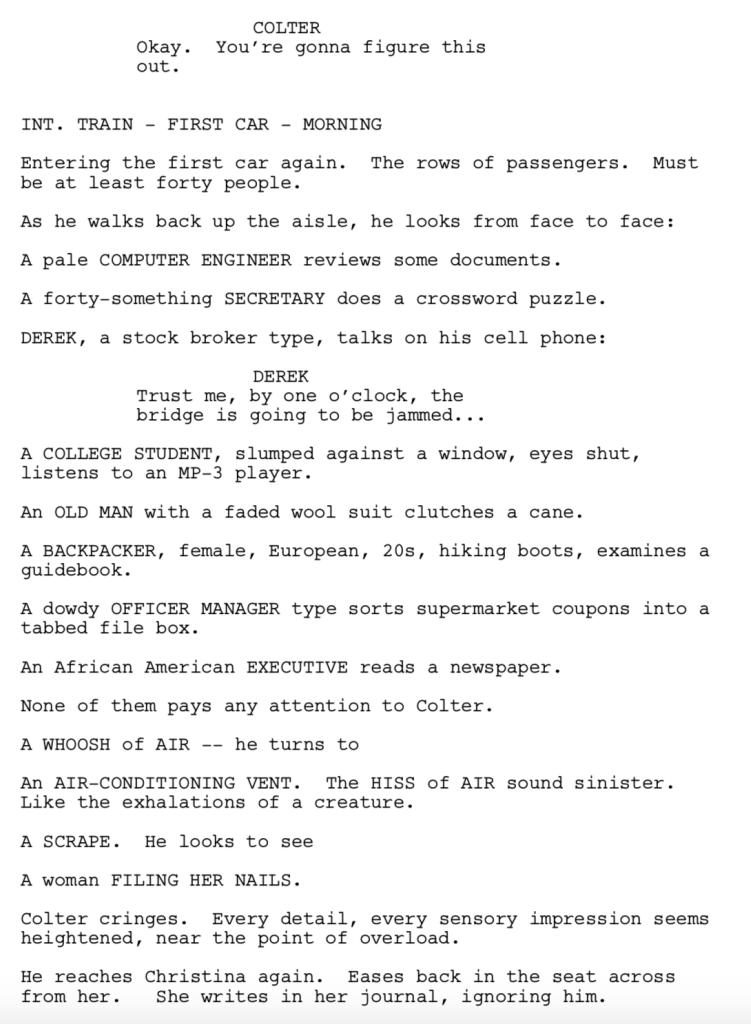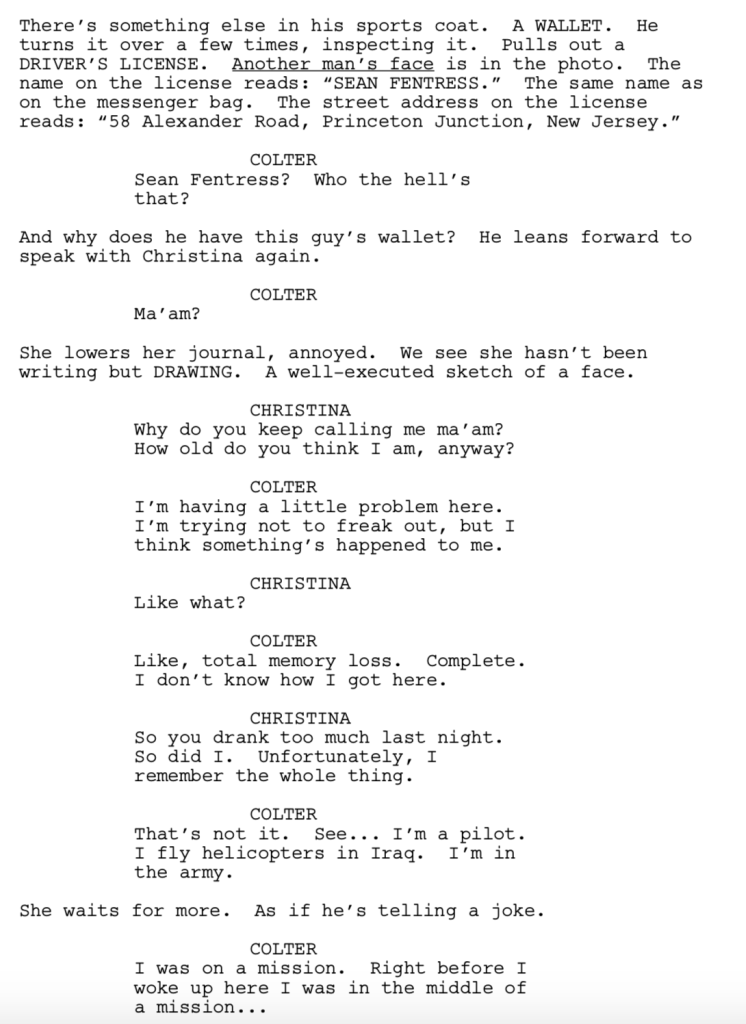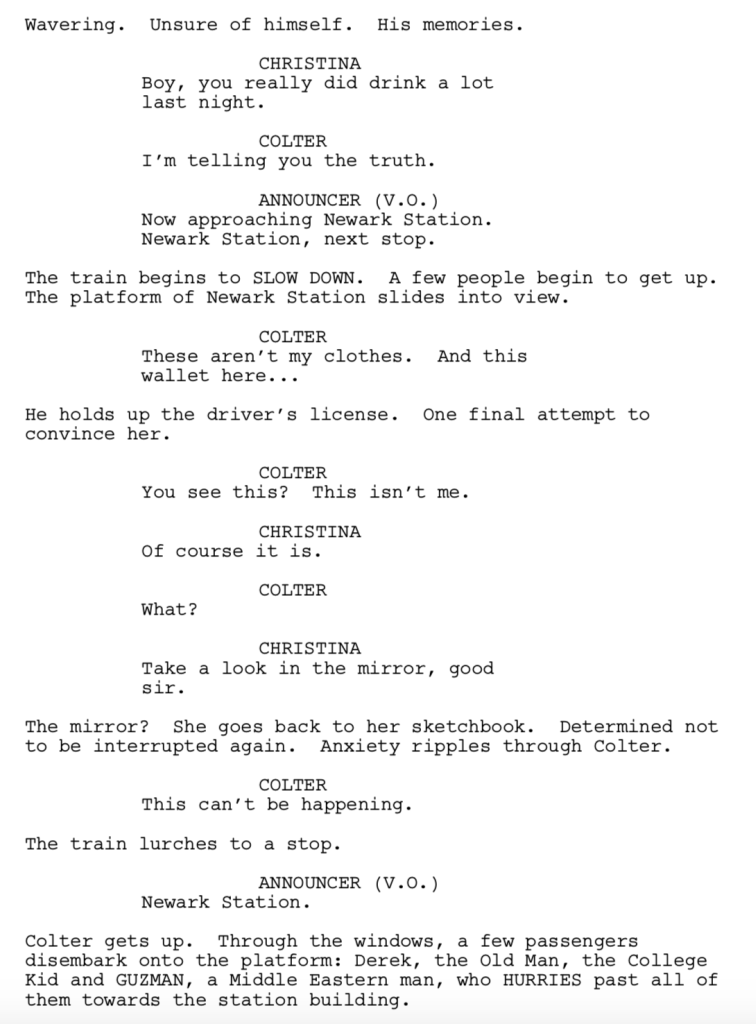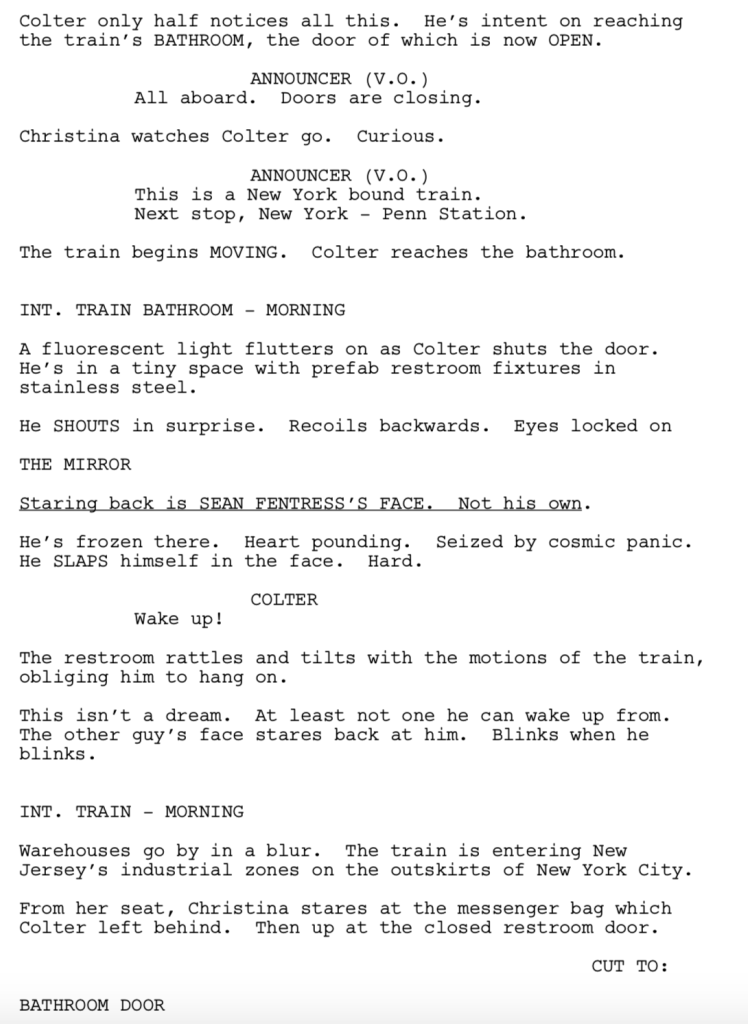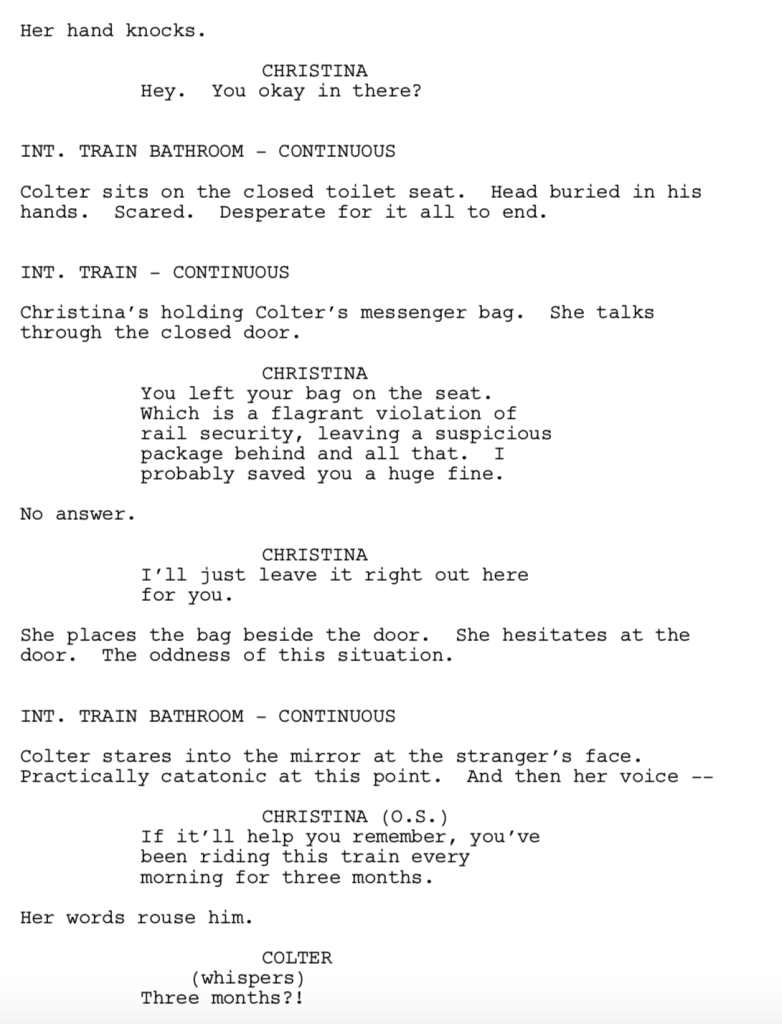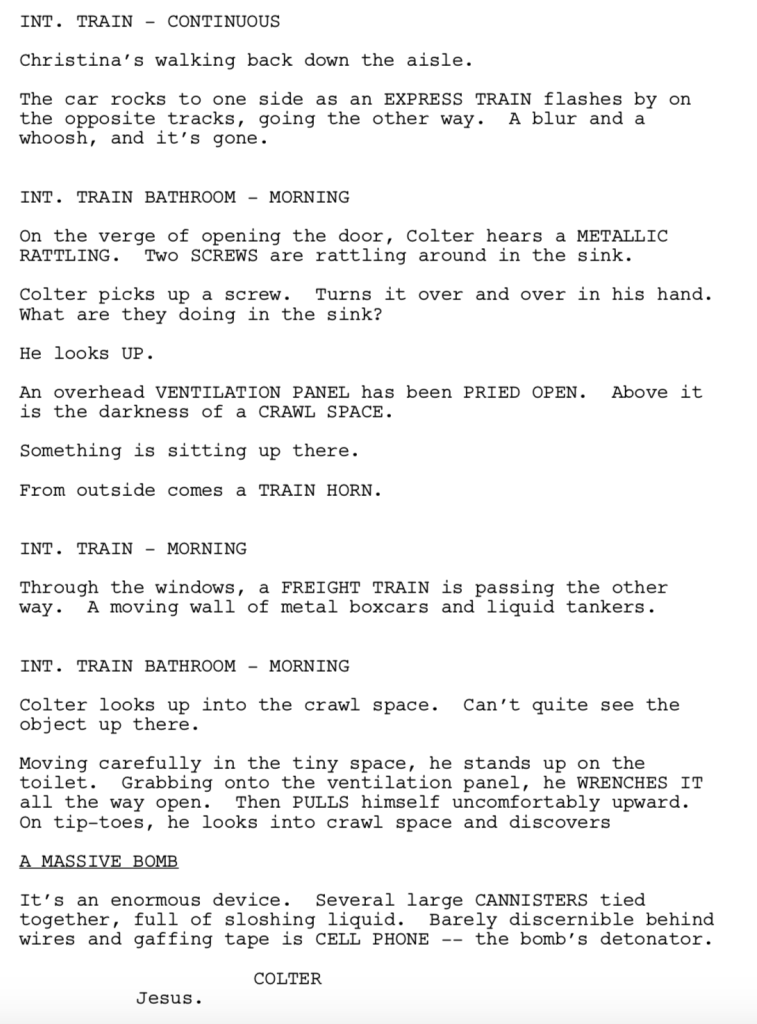Today’s writer has come up with a rather clever pitch: “Bizarro World Jerry Maguire.”
Genre: Sports/Drama
Premise: Atticus Archer is college football’s version of a fixer. As he juggles chasing the nation’s top prospect, a mental breakdown from a star quarterback, and his own personal demons, an NCAA agent arrives on campus to threaten everything.
About: Today’s writer comes from my home town, Chicago (“Daaaaaa Bersh.”). He got this script out there, presumably through his manager (Alex, if you’re out there, can you confirm this?), which secured him representation at one of the top agencies in town, UTA. It has since landed on both The Black List and The Hit List. Speaking of Chicago (and because we were talking about LA’s best fries yesterday), here are the 14 best hot dogs in Chicago, ranked.
Writer: Alex Convery
Details: 119 pages
Let me propose a business model for you. You create a product that generates 1.5 billion dollars in revenue a year… yet you don’t have to pay your workers a dime. Welcome to NCAA football, the most clever scam in sports. Unlike professional football, where you’re giving players hundred million dollar contracts, college football players are deemed “amateurs.” Therefore, they can’t be paid. How unfortunate for those poor colleges. It’s not that they WON’T pay them. It’s that they’re NOT ALLOWED to.
Colleges making billions of dollars off athletes is one of the more interesting conversations going in sports today due to the complexity of the issue. There are some people who say, “Well, they’re getting a 100,000 dollar education for free. So they ARE getting paid, just indirectly.” But if a school is making 150 million dollars off their athletics each year, as a college like Texas A&M is, and that money is being made exclusively because of those athletes, isn’t 25 thousand dollars (a year of scholarship money) a joke?
However, if you believe in paying athletes, how in the world do you do it? A big college may have 30 sports programs. So does every athlete get paid evenly? Or is it done on a sliding scale? And if you have a sliding scale, is it a sliding scale based on the sport, or is it a sliding scale within each sport? A third-string right tackle isn’t nearly as important to a team’s success as the star quarterback. So would they get paid the same? If not, who deterines how much each athlete in each sport at each position gets paid? That seems really complicated. And we’re just talking about the big programs. What if you’re a football player on Tarleton State University where 500 people show up for a Saturday game? Do those students get paid the same amount as the players at Texas? Does the state redistribute funds so everyone gets an equal share?
This is why the NCAA has been able to get away with this for so long. Coming up with an alternative is impossible. Which segues perfectly into today’s script, which examines one of the most important cogs in the college athletics machine – the bag man.
Atticus Archer is 55 years old and ready to retire. Atticus is a “bag man” for Auburn University. In order for colleges to land top-rated high school athletes, they have to pay them. But paying athletes to come to your school is illegal. This is where the bag man steps in, an “independent” agent who unofficially goes to athletes’ homes, gets them to commit to their college, then instructs them where to find a bag, which will, of course, be full of money. If the university were to ever be investigated for paying athletes, it’s impossible to convict them because the bag man is working on his own accord.
We meet Atticus as he tries to convince the best high school quarterback in the country, Ricky Patterson, to switch his commitment from Alabama to Auburn. What Ricky and his father don’t know is that before Atticus showed up, he leaked e-mails showing Ricky’s dad ask for money from Alabama. Just like that, Alabama is out. And who’s there to pick up Ricky and dust him off? Auburn, of course.
Atticus heads back to Auburn where he focuses in on one final recruit, a ginormous freakish defensive lineman named Chance Fluker. Once he gets this dude to commit, he’s officially done. But when he heads to Fluker’s home, he learns that his mother won’t be easily swayed. Unlike the typical mega-athlete families that dream of their big payday, Miss Fluker has actual morals. And she’s not giving those up for a bag. This one, Atticus realizes, is going to be tough.
Meanwhile, the strange circumstances surrounding Ricky Patterson’s sudden switch from Alabama to Auburn has the NCAA suspicious. So they send over Thomas Kendrick, a former star athlete turned agent for NCAA’s investigation unit. Kendrick is tasked with going down to Auburn and figuring out what happened. As soon as Atticus meets Kendrick, he knows he’s no joke. But Atticus’s ego ensures that business will continue as usual. It’ll be up to Kendrick, now, to catch him in the act.
I would re-title this Mixed Bag Man.
It’s a solid read but every time it’s about to get good, something pulls it back. Like a talented quarterback with a penchant for throwing interceptions. You march us 70 yards down the field and then it’s wasted on one bad throw.
The cool thing about Bag Man is there isn’t anything else like it on the market right now. I don’t read many scripts about college football. And I’ve definitely never come across a script about a bag man. To top it off, Convery creates this mano-a-mano clash between two alpha dogs, which makes this feel like the sports version of Michael Mann’s “Heat.” That’s a winning formula right there.
Unfortunately, Bag Man feels like a script destined for an 8-3 season, good enough for a bowl game, but not good enough to get to the championship. Take this battle between Atticus and Kendrick. It’s way too one-sided. Atticus gets 4 times as much screen time, and Kendrick never makes enough headway in his investigation to be a true threat. For these movies to work, we have to feel like the hero is genuinely in danger. If the audience doesn’t believe they have a chance of losing, where’s the tension? Where’s the fear?
Speaking of, the stakes are way too low. What happens to Atticus if he gets caught? He’ll be scolded. He’ll lose his job. But he’s retiring at the end of the year anyway. So is losing his job a few months earlier than planned that big of a deal? Compare this to the stakes in Jerry Maguire. Jerry’s got one client, Rod Tidwell. The two are playing through the season, betting he’ll play well enough to land a big contract. If that doesn’t happen, Jerry loses his business. He loses everything. That’s the best version of “high stakes” you can create – if your hero doesn’t succeed, THEY LOSE EVERYTHING. That was far from the case here.
And it was such an easy fix. Insert a scene where a friend tells Atticus that they’re coming after him hard. “They want to make an example of people like you.” So they’re going to put him behind bars for as long as they can legally get away with. Now something’s on the line.
Another issue I had is I was never clear why Atticus was doing this. Another character even points this out to him – when Auburn wins, the players get the glory, the coach does, the school does, even the students do. But nobody knows who Atticus is. No one will ever cite his name when it comes to the school’s success. So why does he do it? That’s an important question and we never get an answer. We needed that answer.
Despite these issues, the script moves along quickly. Atticus is an active character. And for those of you new to screenwriting, that means he’s a character with a strong goal (he wants to sign Chance Fluker). Strong goals require your hero to act, to go after things, and that’s where you find the drama, in the “going after” part. Because there will always be obstacles getting in the way of that goal and the audience will be curious how our hero will overcome those obstacles. Bag Man actually takes it one step further. In addition to going after Chance, Kendrick is closing in on him. So you have him fending off obstacles both in front of and behind him.
I just wish it felt more important. Figure out the stakes, figure out why Atticus is doing this, and you have a winning script.
[ ] What the hell did I just read?
[ ] wasn’t for me
[x] worth the read
[ ] impressive
[ ] genius
What I learned: Have your writing style match your subject matter and hero. At first, I was annoyed by the writing style in Bag Man. It was one of those scripts with a lot of underlining, ellipses, bolding, excess capitalization. But the further I got along, the more I realized our hero (as well as the subject matter) was big, arrogant, and showy. So the writing style ended up fitting. You wouldn’t use this writing style on a script like Roma. But for Bag Man, it was perfect.
Genre: Romantic Comedy
Premise: (from Hit List) On a Chinese holiday that celebrates those who are not in relationships by encouraging pampering, shopping and partying, lives intersect across Shanghai. From Americans on a journey of self-discovery, to old flames reconnect- ing, to an elderly woman reminiscing on the good old days, seemingly disconnected people will come together in moving, funny and surprising ways.
About: This script finished in the Top 10 of last year’s Hit List. The writer was born in China, attended Harvard, and sold the script to New Line. She has worked as a staff writer on the show, Powerless.
Writer: Lillian Yu
Details: 111 pages
If ever there was a combo snapshot of industry trends, yesterday and today on Scriptshadow would be it. Yesterday, we covered the new version of spec scripts – short stories. And today we’ve got an Asian-influenced female-driven romantic comedy (the third I’ve reviewed this year). Now, if someone could just write an Asian-influenced female romantic comedy short story, it would probably get sold before it left the computer.
Let’s be real. There are two ways you can approach this industry. You can write whatever you fancy, hoping the industry likes it. Or you can target what the industry is looking for and write that. The second one is liked by business-minded artists. The first is liked by creative-minded artists. Today’s writer is unapologetically business-minded.
I’m aware that this makes artists’ skin crawl. But if you’re trying to work in this industry, being business-minded is essential. You must have a component of your brain that thinks like a producer. And producers are looking for content people will pay for. Unless you’re an award-winning director with 20 years of experience who cons a streaming service into paying for a vanity project, you have to bring some capitalist tendencies to the table.
The rub for business-minded artists is soul. Is meaning. They’re so consumed with giving studios what they want that they don’t ever ask what they’re trying to say. Which category does Singles Day fall into? Let’s find out.
As the logline says, Singles Day follows several different characters. There’s Amy, a ditzy American lush who just got dumped. There’s Rose and her white boyfriend Chris. Chris has convinced Rose to go to China to find her long lost family. There’s an old woman, Nai Nai, whose husband just died so she never leaves her room. There’s Bingbing, a jaded Shanghai TV newswoman who hates Singles Day. And there’s Bao Bao, a “back of Page 6” billionaire whose entire experience with dating has been through Tinder.
The story takes place in the two weeks leading up to China’s “Single’s Day,” a holiday confusing enough that I’ll let the narrator explain it: “Originally created to celebrate singledom, Singles “Day” is now a monthlong celebration of self-love, self-indulgence, and most importantly, retail therapy. That’s right: Singles Day is the world’s biggest shopping holiday. Need a new laptop? A pizza delivery drone? A fat-freezing machine because you ordered a pizza delivery drone? Singles Day is the day to get it. Black Friday doesn’t hold a candle to the billions Singles Day makes.”
Amy’s storyline is the one that drives the first half of the script. After getting dumped, she reads about Singles Day, becomes convinced it’s how she’ll find love, and drops everything to fly to Shanghai. Unfortunately, every single Chinese man she meets thinks she’s Jennifer Lawrence then walks away when they realize she’s not. Amy bumps into Bingbing, who’s having trouble finding love herself, and the two become temporary friends. Bingbing is very supportive of Amy finding love.
The second half of the script is driven by Bao Bao, whose father is sick of his son being a tabloid punchline. So he tells him that if he doesn’t find a wife by Singles Day, he won’t get any of his inheritance. For the first time in his life, Bao Bao will have to look at a girl as a potential lifelong partner as opposed to a potential one night hookup. Will he be able to do it? What about Amy? Will she be able to find love? Oh, and then there’s a shocking final twist that will bring all of these storylines together. Singles Day indeed!
I was on board with this script initially. The best thing about Hollywood’s rush to embrace diversity is bringing in new stories from other cultures that liven up a stale medium. A brand new Chinese holiday seemed like the perfect vehicle to achieve this.
Unfortunately, that is not this script.
This is the exact same movie as those abysmal holiday-centered rom-coms that, arguably, destroyed the genre in the early 2000s. You know, the ones that all seemed to star Ashton Kutcher?
The second this script died for me was when the “Find a mate in 10 days or you lose your inheritance” plotline was introduced. It took what could’ve been a thoughtful look at a unique holiday and turned it into every lazy rom-com ever. It destroyed any sense of realism the script had. When you introduce unbelievable threads, suspension of disbelief dies. Same thing with the Amy storyline. Amy gets dumped by the love of her life. The man she thought she was marrying. Three days later she’s on a plane to Shanghai looking for love? In what reality does a decision like this exist?
I understand that there’s a wish-fulfillment quality to rom-coms that allows for whimsy. But the best rom-coms always lean towards realistic scenarios, realistic decisions, and realistic characters. One of the reasons Pretty Woman is considered the best rom-com of all time is that it was originally written as a drama. What that did was it established a baseline for realism. The characters didn’t do silly unrealistic things. They made decisions that had to stand up to dramatic scrutiny. One of the things Gary Marshall talked about with Pretty Woman was how extensive the research was that went into Richard Gere’s character’s business deal. Singles Day doesn’t have any of that.
On top of that, if you’re going to make a character driven movie, the characters can’t be fake and unrealistic. A character piece needs to dig deeper. Richard Gere worked because he was an empty vessel who forgot how to enjoy life. That was the flaw he was battling. Julia Roberts was a conflicted person who was struggling with her worth as a human being. Did a hooker deserve a man of this stature? That film explored that question in an honest way. This attention to detail seems to have gotten lost in the romantic comedy.
I remember when I started screenwriting, I’d always hear the advice, “Your story needs a foundation.” And I never knew what that meant. It was such a common tip that I was obsessed with finding the definition for it. It was years later that I learned it means your story must be grounded in a sense of reality that informs your characters choices. Because if your characters don’t exist in a reality, nothing they do will be genuine.
The most blatant example of this is the “Go ahead, shoot me” character. The character who gets a gun shoved in his face and he says, “Go ahead, do it.” Why? Because he doesn’t exist in reality. Reality is a character who values life. Who knows that if he dies, his kids grow up without a father. Who knows that his wife will live the next 50 years in sadness. But it sounds cool to say, “Go ahead, shoot me,” so the writer writes it. It’s disingenuous. The writing in Singles Day isn’t this blatant, but it’s closer to this than it is to being real.
Look, tolerance for realism in comedy is a sliding scale. For some, the broadness of these characters and their choices may be just right. But I believe the best comedy stems from real situations, real characters, and real life. And I didn’t see enough of that here.
[ ] What the hell did I just read?
[x] wasn’t for me
[ ] worth the read
[ ] impressive
[ ] genius
What I learned: If the centerpiece of your story isn’t clear, your script’s got problems. Singles Day begins as a day. But then we learn it’s a month. Then we learn it’s about being proud and single. But actually, it’s about buying as many things as possible for 30 days. But then it’s about people finding love, the exact opposite of what its initial claim was. Is anyone as confused as I am?
You wanted an update. You got it! There are hundreds of entries, possibly over a thousand (a couple hundred came in last night at the last second). So I will be reading these over the next month. I will be announcing winners (if any) on Monday, March 11th. In the meantime, hang tight!
Spielberg swoops in and locks up a short story from the /NoSleep subreddit, a growing breeding ground for movie projects.
Genre: Horror
Premise: After his friend takes his life, a young man teams up with the girl being blamed for the suicide to look for a mythical spire popularized in a local ghost story they believe to be the true cause of the death.
About: We have ANOTHER short story sale – this one picked up by Amblin! Steven Spielberg’s company! This is another sale stemming from the /Nosleep subreddit. “It” producer Roy Lee will co-produce. The most amazing thing about this sale is that the story was posted five years ago! Never give up, right? You can read the short story here.
Writer: Tony Lunedi
Details: 8 pages
How many times do I have to say it? Short stories are the new spec scripts. Evolve or die. Okay, maybe keep writing screenplays. But if you aren’t expanding your portfolio into shorts at this point, I don’t know what to tell you.
A couple of days ago in the comments section, one of you pointed out that you’d queried everyone in town and only gotten back two replies. Another reader replied to this comment that the days of cold querying were over, that most people in town expect you to use online resources to get noticed (places like Scriptshadow, the Black List, social media, self-publishing, /Nosleep). They let real people do the vetting process for them since they no longer have the time or patience to do so. I don’t know if we’re all the way there yet. But we’re close. And it makes sense. If you’re serious about this profession, you’ll figure out a way to get your work seen. And when your skill level lines up with your marketing savvy, someone will take notice.
That last part of the equation is crucial. A lot of writers get their stuff out there, and when nothing happens, blame the delivery method. If people aren’t responding to your work, there’s a good chance something’s wrong with your writing. If you’ve got the dough, you can hire people like me (writers often send me a script and say, “Tell me what’s wrong with my writing so I can improve it”), or you can take the feedback you get from the public, create your own online curriculum, and get better in those weak areas. But you never want to blame “the system” for your lack of success. Once that happens, you’ve sealed your fate, because it means you’ll stop trying to get better.
“Robert Edward Kennan killed himself in the Fall of 1999…” That’s how our unnamed 17 year old narrator starts his story. After Robert leaves two suicide notes, one to the beautiful but cold Alina, the other to mutual friend Fletch, rumors spread that Robert killed himself because Alina rebuffed him.
Our narrator regales us with his love for scary stories, particularly ones steeped in local New England lore. There is one in particular, The Widower’s Clock, that chronicles a clockmaker in the early 20th century who built an elaborate clock, the kind that appears on giant churches, complete with life-sized dancing figures. When he caught his wife sleeping with another man, he killed them and placed each of them inside these dancing figures. The clock never sold, and the rumor is that it is buried on one of the many uninhabited islands off the coast of New England.
This is relevant because Robert indicates in his suicide letters that he heard the bells from the clock and followed them to their source, where he witnessed something horrifying. Alina believes if they can prove the clock exists, she’ll be off the hook as the cause of Robert’s suicide. So our narrator joins her, Fletch, and the only other person who knows more about the lore of this area than he does, the tall and gangly “Scary Kerry,” to locate the clock. But when he begins to fall for Alina himself, he loses crucial perspective, putting the entire pursuit in jeopardy.
This is SO MUCH better than that abysmal piece of garbage we had to endure the last time a short story sold. Whereas that story was marketed exclusively to literary types more interested in metaphors and symbolism than logic and narrative focus, today’s writer is focused solely on providing an entertaining story. And boy does he succeed.
The thing I’ve learned about horror stories is that they don’t jump into GSU (goal, stakes, urgency) right away. They begin with a mystery. Eventually that mystery requires our characters to try and solve it (and GSU appears). But before that, we’re pulled in by the mystery itself. The simple question of “Why did Robert commit suicide?” is a good one, since the implication is that his death is connected to an old ghost tale.
And not just any ghost tale, but a creepy one. Arguably, Lunedi’s most prominent skill is detailing these old ghost tales. He doesn’t stop at the facts. He paints a picture. I loved, for example, how the clockmaker finished this Magnus Opus of his, had two major bidders on the line, only for the Depression to hit, ensuring that the clock would never sell. These are the details that turn average stories into great stories.
This detail is extended into characters as well. Nobody gets introduced without backstory that contextualizes them. Even secondary characters. For example, Lunedi doesn’t write, “I found out something was wrong on Tuesday morning when Fletch’s rust-bucket didn’t show up in my driveway like it usually did. Instead his dad arrived.” He writes, “I found out something was wrong on Tuesday morning when Fletch’s rust-bucket didn’t show up in my driveway like it usually did. Instead his dad, an air force officer nowhere near as affable as his son, was waiting for me.” It may seem like a small change, but notice the difference in the way your brain imagines this person with the first example as opposed to the second. We can SEE a former Air Force Officer. We can’t see a “dad.” A “dad” could literally be any adult male.
My biggest takeaway from this story, however, is how much effort was put into it. When you read all the other stories on /Nosleep, it isn’t that they’re lazily conceived. It’s that they’re lazily explored. These writers believe they can throw something together in an inspired weekend and blow everyone away. When you read the level of detail in this story, the way the characters are conceived and explored, the way the plot evolves, the way the prose is written – you can tell that this story was obsessed over.
To bring this back to screenwriting, I see the same problem. Writers put stuff out there that’s clearly four, five, even ten drafts away from being ready for discerning eyes. They’re so happy they finished, they want to share their work with the world. But that’s not the work that gets recognized. The work that gets recognized is the work that the writer worked meticulously on. They didn’t stop until they got every character and plot beat and line of dialogue and line of action and subplot and reveal to where they were satisfied with it. You clearly see that in Spire. I don’t see that nearly enough in the scripts that I read and would identify it as one of the major differences between amateur and professional work.
[ ] What the hell did I just read?
[ ] wasn’t for me
[xx] worth the read
[ ] impressive
[ ] genius
What I learned: If you’re considering writing a horror movie (or short story), consider setting it ANY TIME before the ubiquity of internet and cell phones. With each passing year, we become more connected, more available, easier to track down – all things that work against a good horror scenario. With horror, the feeling of isolation, of nobody coming to your rescue, needs to be present. And the past is the best place to find that. This story is set in 1999. I don’t think it works if it’s set in 2019. I believe this is a big reason “It: Part 1” worked. It’ll be interesting to see how they deal with this in the upcoming sequel, which takes place in the present day. I have a feeling it won’t be as scary. (As with every guideline, there will always be exceptions to the rule)
You have until Sunday, midnight, Pacific time, to turn in your first 10 pages. Send a PDF to Carsonreeves3@gmail.com with the subject line, “FIRST 10 PAGES.” If you don’t know about the First 10 Pages Challenge, go here. In the meantime, here are 10 pages to inspire you.






